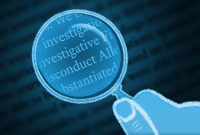Misconduct and Complaints

Taking a trauma-informed approach to investigations helps protect all participants—especially those harmed—while improving the quality and fairness of the investigative process.
From alcohol misuse to workplace misconduct, these events blur the line between professional and personal life, creating potential liabilities. In this article, discover strategies to host safe and enjoyable workplace celebrations. Learn how to set clear behavioral standards, plan responsibly, and protect employees while fostering camaraderie.

Learn why fair and well-conducted investigations that respect due process are crucial for maintaining trust, for preserving core values, and for holding offenders accountable.

Do you really need that workplace investigation? In many cases, the answer is absolutely “yes”…it may even be legally required. Read on to find examples of when “Yes, you should have an investigation!”

This review of the book "When Narcissism Comes to Church," by Chuck DeGroat, discusses how leaders can reflect on narcissistic tendencies both within themselves and their congregation as a whole, and provides hope for healing.

Preventing and responding to sexual abuse is a major issue for churches and ministries. This article discusses the various ways in which attorneys can help organizations prevent and respond to abuse and discusses what ministries should expect from their attorneys.

Abusive speech is no longer protected by Section 7 of the National Labor Relations Act. Employers now have more authority to discipline employees for offensive language in the workplace.
How should an organization respond to a complaint of sexual harassment? This post provides an overview of how to respond effectively to address and prevent sexual harassment.
This post provides an overview of the EEOC’s new interpretative guidance on retaliation for employment discrimination claims, including practical tips for employers.
